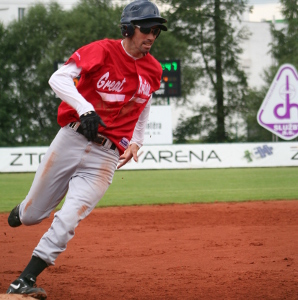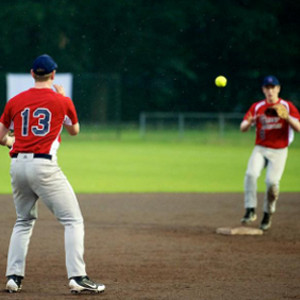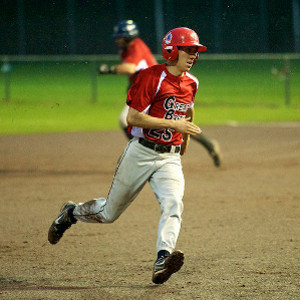The GB Men's Fastpitch Team is assembling in Australia for acclimatisation and warm-up games before crossing to Auckland, New Zealand to play in their third straight ISF Men's World Championship from March 1-10.
Under Head Coach Russ Snow, the GB Team will go into the tournament as the eighth-ranked team in the world, and has hopes of ending the competition with an even higher ranking.
An increasing number of players on the GB Men's Team now live in Britain, and a number of those players grew up and learned their softball here. Below, three of the team's GB-based players – Steve Rice, Josh Peat and Steve Hazard – answer questions put by GB Team Manager Steve Fullan about how they got into softball, what they like about men's fastpitch, their expectations for the World Championships and other topics.
STEVE RICE
Steve Rice has been a member of the GB Men's Team for the past three years, but has also been involved with the London Meteors and London New Zealand club teams since 2005.
Q: Where did you grow up and how did you first get involved in fastpitch softball?
I grew up in Wellington, New Zealand and started playing softball aged 11 after deciding I’d like to try something else because I found cricket a bit slow. At that time in New Zealand, “softball” was “fastpitch softball” – there was no such thing as slowpitch. I enjoyed the game immediately – it’s a fast-paced game with very little standing ar
Q: When people find out that you're a softball player, what is their standard reaction?
"What is softball?" or “It’s like rounders, isn’t it?”. Most people are surprised that the ball is actually not soft and is pitched at high speed.
Q: What do you think makes men's fastpitch special and what do you think it offers compared to slowpitch or baseball?
You have to be much tougher mentally in a fastpitch game than a slowpitch game. There is much more to think about with every pitch and the game can often be decided by a single run, so one mistake can often make the difference between winning and losing.
Q: You were part of the Great Britain National Team that finished third in the 2010 and 2012 European Championships. What are your main memories of those tournaments?
My lasting memory from both tournaments was of the focus and intense competition on the field, coupled with the relaxed, fun atmosphere off the field. That and some dignitaries flying in via helicopter to land on the pitch ahead of the Opening Ceremony! It has also been a fantastic opportunity to play with (and against) some very good ball players in a top level competition.
Q: Great Britain has the World Championships to look forward to in March in Auckland, with preliminary round games against Samoa (really a New Zealand B team), Venezuela (Pan Am Champions), Australia (defending World Champions) and the US – all traditional powerhouses. Other teams in our group are South Africa, Indonesia and arch rivals the Czech Republic. What are your hopes and expectations for the event? How do you feel about playing for Great Britain in a World Championship and what does it mean to you?
Don't get me wrong – like any ballplayer who puts on the GB shirt, I want to start. But this isn't the European Championships here. Most of the GB team are amateurs but at the Worlds we will be facing full pro ballplayers who travel the world, so we all need to raise our game, train our asses off and push for places. No one is guaranteed a spot.
Q: What's your overall opinion of the domestic scene and do you think men's fastpitch has any future in Britain? What do you think would have to happen to secure a future for the sport?
Currently there is very little men’s fastpitch softball in the UK and what there is relies on a small number of guys, predominantly ex-pats, who are able to pitch. Pitching is a skill that takes time to develop and a lot of time to be able to pitch consistently under pressure.
In order to improve and expand the game here, it is vital that kids are introduced to the sport early and encouraged to develop key skills from a young age. This relies on clubs and schools having the facilities and organisation to support and encourage kids getting into the game.
JOSH PEAT
Josh Peat, though only 19 years of age, has been a GB Senior Team player for the past two years and most recently played in the 2012 European Championships.
Q: Where did you grow up and how did you first get involved in fastpitch softball?
I was born in Nottingham, the home town of Robin Hood. I started playing baseball at a very young age, which introduced me to the sport. I first found fastpitch softball around four years ago, but there wasn’t an Under-19 team when I first joined so I was training and playing amongst the girls' teams. This is where I grew to love the speed of the game and loved putting in the effort and determination to get better.
I went away with the Under-19 Men's Team that was put together three years ago, and we went to our first European Championships and came fourth. After that, I was asked to come along and play in the Men's European Cup and from there I got the chance to train and then travel with the Men’s Team to the Euros in 2012. This was an amazing experience and made me determined to play more and improve.
Q: What do you think makes men's fastpitch special and what do you think it offers compared to slowpitch or baseball?
For me, the game is much faster and I have to be ready at all times because anything can happen. I still enjoy playing the other two sports, but in fastpitch, I just enjoy the speed of the pitchers and just how it’s different.
Q: You were part of the Great Britain National Team that finished third in the 2012 European Championships. What are your main memories of that tournament?
I remember the first time stepping up to the plate to face the pitcher, as moving up from the Under-19s, the pitchers were much faster. I enjoyed the step up and wanted more and more every time I went up to bat.
I also remember meeting new people. Everyone on the team got along with everyone else and I loved the feeling of being a part of the Great Britain team.
Q: What's your overall opinion of the domestic scene and do you think men's fastpitch has any future in Britain? What do you think would have to happen to secure a future for the sport?
I think men's fastpitch does have a future in GB – it just need to be spread around the country, making more people aware of it how much fun it is and how you meet new friends. And by working hard, you might even get to travel and play ball around the world.
Q: Finally, if there are any youngsters reading this keen to give softball a try, what advice would you give to them?
Get in touch with the person in your local area that might run a softball club or get in touch with BaseballSoftballUK. Just come along and have fun. You will make loads of friends that will last forever. It’s a friendly environment, so come along, get and a glove and start playing.
STEVE HAZARD
Though still only 26, Steve Hazard has been playing baseball and then softball (slowpitch and fastpitch) for the past 16 years, and has emerged as one of the most talented and athletic players that Britain has ever produced.
Q: Where did you grow up and how did you first get involved in fastpitch softball?
I grew up in Nottingham and at the age of 10 I started playing baseball for a local club which was managed by a friend of my uncle. I played for that team up un
I had been aware of fastpitch softball for quite a while but never really had the time or finance to play both sports. It was only a couple of years ago that I was convinced to go and play in a fastpitch tournament in Holland and I genuinely had the time of my life, even though I sucked on that particular occasion! It upsets me to think that I’d been missing out on such a great sport for such a long time, but I am happy now that I am part of the GB squad and competing at such a high level.
Q: When people find out that you're a softball player, what is their standard reaction?
I usually get reactions such as “Is it like rounders?” or “Is the ball soft?” I used to get really annoyed when people asked those kinds of questions, but now I see it as my responsibility to educate those people about the game and encourage them to come along and play. When I started working at my current work place, I was asked so many different questions about the game and nobody would believe me that it could be played at such a competitive level, so I gathered a bunch of work colleagues together and we had a game of our own. All of my work colleagues were pleasantly surprised at the complexity of the game and the skills required, especially the one who nearly died after I ripped the ball at him at 100 mph! This wouldn’t have been too much of a problem as it was a group of 20 paramedics!
Q: What do you think makes men's fastpitch special and what do you think it offers compared to slowpitch or baseball?
Fastpitch softball is without a doubt more intense than both baseball and slowpitch softball. I have played all of these sports and I can say I am a huge fan of all three, but fastpitch softball is a much quicker and more intense game as it provides all the aspects of baseball but played on a smaller pitch, so you have very little room for error. Slowpitch softball it is generally a slower game, and you have periods during the game where you may lose focus, but if you switch off for even a split second in fastpitch, it could lose you the game. I tend to leave any fastpitch game physically and mentally tired due to the amount of focus it requires, especially as a shortstop.
Q: You were part of the Great Britain National Team that finished third in the 2012 European Championships. What are your main memories of the tournament?
My memories were happy for sure, but obviously my main memory has to be the game which qualified us to go to the World Championships. This was probably the most intense competition I have been involved in and we came third, which is a massive achievement for the team. We have definitely left the impression out there that the GB Men’s Team isn’t one to be messed with, and I’m feeling confident that this will be reflected out in Auckland when we face the best teams in the world.
Q: Great Britain has the World Championships to look forward to in March in Auckland. What are your hopes and expectations for the event? How do you feel about playing for Great Britain in a World Championship and what does it mean to you?
I will start by saying that it means the world to me that I have been selected to play for the GB Men’s Team in the World Championships. I am still developing my skills in fastpitch softball but I am glad that the coaching staff think that I have what it takes to represent the GB Team in Auckland.
After listening to the more experienced players who have been at previous European and World Championships, I believe that we have a great chance of being one of the top competing teams in Auckland, as they believe this current team is the strongest bunch of players ever assembled for the GB Men. It would be ambitious to say that we’re going to go over there and win it, but I like the thought that any team we face will know that the GB Men are a force to be reckoned with!
Q: Finally, if there are any youngsters reading this keen to give softball a try, what advice would you give to them?
My advice is to not give up after your first attempt! If this was the case then I wouldn’t be playing the game today. I had the weakest throw on my team when I first started playing and I generally wasn’t as good as some of the more experienced kids. Fortunately, my coach noticed that my throw was at least accurate and explained that after a little training it will get stronger. I spent hours and hours every day trying to strengthen my throw and now I have one of the fastest throws on the GB team.
It’s important not to give up on softball as everyone has something good that they can bring to the game. Even if you’re not the perfect athlete, there are lots of different leagues playing at lots of different levels. I can guarantee that you will be able to find one that suits you.
One thing I can say for definite is that if you keep playing softball, you will quickly find yourself addicted to the game, just like everyone else I know who plays.

